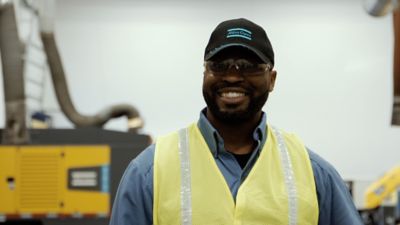Choosing Between Piston and Screw Compressors
Do I Need a Piston or Rotary Screw Compressor?
You should consider a piston compressor when you need low duty cycles, low initial costs, low daily running hours, and noise isn't a factor for your application. A rotary screw compressor might be best when your application requires low noise levels, longer service intervals, and long duty cycles - and lifetime operating cost is key.
Piston (reciprocating) compressors and rotary screw air compressors are two of the most popular compressor technologies available today. But do you know which one would be better suited for your specific needs and applications? We cover the basics of what to consider when choosing between a screw and piston compressor.
What Should I Know Prior to Selecting Any Compressor Technology?
If you're choosing between a piston and screw compressor, ask yourself these questions. The answers will help you start to determine which compressor technology might fit your application best!
- What is the application?
- How much flow does my facility/workshop use?
- What pressure is needed within the facility?
- Do I need clean/dry air (use of dryer and filters)?
- How many hours per year does my compressor operate?
- How many shifts do I run per day?
- Is there fluctuation in flow demand between shifts (if so, a VSD compressor could be a good option and offer great savings)?
- Are there any plans for future expansion?
Piston Compressor vs. Screw Compressor: What to Consider
Initial and operating costs, energy efficiency, duty cycle, service intervals, and noise levels are important factors to consider when determining whether your business will benefit most from a piston or a rotary screw compressor.
- Initial Cost vs. Operating Costs. Pistons have a lower initial cost than screws, but screw compressors cost much less to operate over time. This means that when thinking about your budget, you need to include both the initial costs, but also how much you’ll pay for your compressor in the long run (i.e. your overall operating costs).
- Energy Efficiency. If both a piston and a screw were running the same amount of hours, the screw compressor will be much more efficient and have lower operating costs than the piston over the lifetime of the compressor.
- Duty Cycle. Screw compressors have long duty cycles and are engineered to run 24/7. Piston compressors are limited in their duty cycles, they’re ideal for applications with low duty cycle requirements and low daily running hours.
- Service Intervals. Piston compressors have more moving parts than screw compressors, which means is more wear and tear. Because screw compressors don’t have as much wear, they have reduced maintenance needs. But keep in mind that it’s important to keep any type of compressor on a consistent maintenance schedule to ensure that your machine's efficiency and optimal system performance.
- Noise Levels. Piston compressors are loud, whereas screw technology operates much quieter. If you’re looking for a lower-noise machine or a low noise level is required, you may want to consider a screw compressor.
Additional Considerations for Choosing a Piston or Screw Compressor
- Maintenance Needs. The wear and tear experienced by piston compressors is greater than that experienced by screw compressors. The reason is simple: a larger number of moving parts! Screw compressors, on the other hand, don’t have as much wear; hence, they have reduced maintenance needs.
- Noise and Operating Temperatures. Screw compressors typically have lower operating temperatures than piston compressors, given that the screws do not come into contact, whereas piston rings are in constant contact with the cylinder walls. This creates greater friction and higher temperatures. This is also the same reason that screw compressors also have lower noise levels and a lower degree of vibrations than piston compressors.
- Air Flow. The high temperatures generated by piston compressors means that they shouldn’t be run non-stop due to the risk of overheating. The rotary screw compressor, however, is not only capable of being run continuously, but is engineered to be run continuously!
The Recap
You should think about choosing a reciprocating compressor when you need a small amount of air, don’t need to use compressed air continuously, and you need a lower initial cost. However, if the compressed air is used continuously, you require lower noise levels, longer service levels, or overall lower operating costs.



